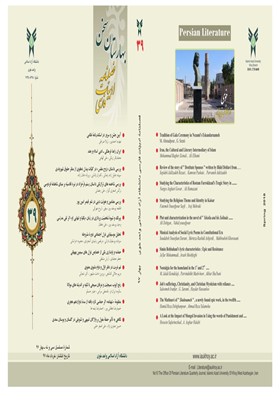A Look at the Impact of Mongol Invasion in Using the words of Punishment and encouragement in Saadi's Gulistan and Boostan
Subject Areas : Abstract ArticlesHossein Safarinezhad 1 , Ali Asghar Halabi 2
1 - PhD Student in Persian Language and Literature, Tehran Central Branch, Islamic Azad University, Tehran, Iran.
2 - PhD Student in Persian Language and Literature, Tehran Central Branch, Islamic Azad University, Tehran, Iran.
Keywords: society, punishment, Encouragement, Keywords: Mongol, Saadi's Gulistan and Boostan,
Abstract :
Abstract Saadi of Shiraz should be considered as one of the greatest teachers of ethics and one of the most influential speakers of Iran. He, beautifully and clearly in his work, as a committed sociologist, stated the great events of his time which coincides with one of the most important historical periods of the country, devastating Mongol invasion. The present paper tries to provide some examples of verses and phrases with the vocabulary of punitive and encouraging in two moral – didactic books of The Gulistan and The Boostan where punishment has higher frequency compared to encouragement in terms of types and frequency. Also, its increase in the Boostan has more significant growth than in the Gulistan could be the consequences of uncultured people and semi-wild government on people and the prevalence of crime, criminality and violence among the rulers of society and in turn in people.
فهرست منابع و مأخذ
1 ـ انوری، حسن، (1384)، شوریده و بیقرار (دربارۀ سعدی و آثار او)، تهران، قطره.
2 ـ آیتی، عبدالمحمّد، (1369)، شکوه سعدی در غزل، تهران، هیرمند.
3 ـ براون، ادوارد، (1357)، تاریخ ادبی ایران (از سنایی تا سعدی)، ترجمۀ غلامحسین صدری افشار، تهران، انتشارات مروارید، چاپ دوم.
4 ـ پزشک زاد، ایرج، (1381)، طنز فاخر سعدی، تهران، نشر شهاب.
5 ـ پورپیرار، ناصر، (1377)، مگراینپنجروزه، بازخوانیانتقادی مقدّمۀگلستان، تهران، نشرکارنگ.
6 ـ ثروت، منصور، (1388)، سیاست مدن از دیدگاه سعدی، تاریخ ادبیّات، شمارۀ60/3 ، بهار، تهران، از 5 تا 20.
7 ـ جوینی، عطاملک، (1367)، تاریخ جهانگشا، به تصحیح محمّد قزوینی، تهران، انتشارات بامداد.
8 ـ دشتی، علی، (1364)، قلمرو سعدی، تهران، وزارت فرهنگوهنر، ادارة کلّ نگارش.
9 ـ رحمانی، فاتح و همکاران، (1389)، بررسی گلستان سعدی با تکیه بر یافتههای روان تحلیلگری ، شعر پژوهی، شمارۀ 5، زمستان، تهران،از 91 تا 120.
10 ـ زرّینکوب، عبدالحسین، (1379)، حدیث خوش سعدی (دربارۀ زندگی و اندیشۀ سعدی)، تهران، سخن.
11 ـ سبزیانپور، وحید، (1390)، بازتاب حکمت ایرانی در آثار سعدی، شعر پژوهی، شماره 9، پاییز، تهران، از 49 تا 76.
12 ـ سعدی ، مصلحالدّین، (1378)، کلیّات، به تصحیح محمّدعلی فروغی، تهران، هستان.
13 ـ ____________ ، (1375)، بوستان، به تصحیح غلامحسین یوسفی، تهران، خوارزمی.
14 ـ ____________، (1374)، گلستان، به تصحیح غلامحسین یوسفی، تهران، خوارزمی.
15ـ ماسه، هانری، (1369)، تحقیق دربارۀ سعدی، ترجمۀ دکتر غلامحسین یوسفی و دکتر محمّدحسن مهدوی اردبیلی، تهران، توس.
_||_

